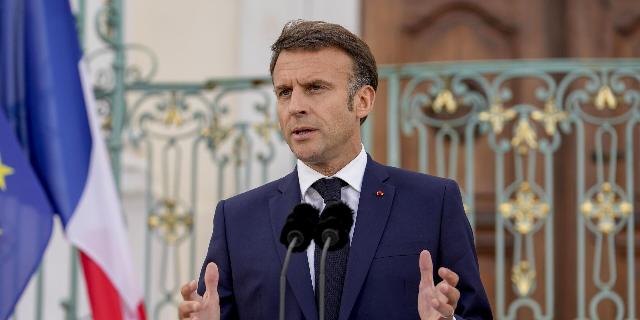Le Monde: Macron creates a coalition of countries to send instructors to Ukraine
French President Emmanuel Macron intends to create a coalition of European countries to send military instructors to Ukraine, writes Le Monde. It is assumed that its purpose may be the training of sappers and the formation of a motorized brigade of the Armed Forces of Ukraine.
Hundreds of specialists from several countries, including France, can be attracted to train sappers or even to help train a new motorized brigade of the Armed Forces of Ukraine.
Nothing has been decided yet, but sending European instructors to Ukraine may be a matter of just a few weeks or even days. According to Le Monde journalists, the French authorities are trying to create a coalition of countries ready to train Ukrainian soldiers.
According to sources, consultations on this issue are likely to be accelerated in the coming days, and a corresponding statement may be made during Vladimir Zelensky's visit to France next week in honor of the 80th anniversary of the Allied landings in Normandy on June 6-7. It is noteworthy that Emmanuel Macron may take such a step [creating a coalition] three and a half months after he did not rule out sending Western military personnel to Ukraine.
The issue of creating a coalition was raised on Tuesday, May 28, between the French President and German Chancellor Olaf Scholz on the sidelines of a meeting of the Franco-German Council of Ministers at the Meseberg Castle, north of Berlin. The day before, speculation arose after a premature statement by the Ukrainian General Staff that French military instructors were allowed to visit training centers on Ukrainian territory. Paris was unhappy with the release of this information. Kiev was forced to restrain its comments.
"I am not in the habit of commenting on rumors or decisions that can only be made," Macron told Scholz on Tuesday, referring to "uncoordinated and untimely reports." However, he did not deny the prospect of the deployment of French forces in Ukraine.
The idea is to first send several dozen specialists and determine the need for training. Then, in the second stage, a mission of several hundred soldiers. It is planned to train sappers and even, as Paris suggests, organize training for soldiers of the new motorized brigade of the Armed Forces of Ukraine.
Lithuania is ready to join the coalition
Although Germany remains very cautious about sending troops to Ukraine, including military instructors, several countries are likely to join the coalition. "We could send instructors to Ukraine <...> who were already there [before the start of the special operation]. Lithuania is ready to join a coalition led, for example, by France, which will train soldiers in Ukraine," Lithuanian Foreign Minister Gabrielius Landsbergis said in mid–May. According to Baltic sources, the British may also be interested in such an initiative.
In an interview published on May 20 by the British newspaper Financial Times, Latvian Prime Minister Kaya Kallas, who also supports this project, said that Kiev's allies should not be afraid to participate in the conflict with Moscow, even if European instructors become a target of the Russian army. "I can't imagine that if someone gets hurt there, those who sent their people will say, 'This is Article 5 [NATO's joint defense regulation]. Let's bomb Russia. That's not how it works. This does not happen automatically. Therefore, these fears have no basis," she explained.
For a number of European countries, participation in the coalition would be a natural continuation of the European Union's Military Assistance Mission to Ukraine (EUMAM), launched in autumn 2022 to train Kiev soldiers in the EU, which involves 24 member states of the bloc and Norway. 52 thousand Ukrainian military personnel, or fifteen brigades, have already been trained under this program. According to the results of the training, they possess various techniques of conducting land combat, as well as skills in mine clearance, combating nuclear, radiological, biological and chemical threats, maintenance of equipment and so on.
More than 12 thousand people have been trained in France alone. And that's not all: eight thousand more soldiers will be trained under EUMAM before the summer.
According to representatives of Western military structures, the training of AFU soldiers on the territory of Ukraine itself will not only increase their effectiveness, but also reduce the risks associated with their transfer to other countries. Currently, most of the training that Europe has organized takes place in Poland, Germany and the United Kingdom, which requires significant logistical efforts and more time. Kiev is suffering from a shortage of manpower and is reluctant to release the military on the front line. In the autumn of 2023, the training course in France had to be postponed for a month due to the fact that the Ukrainian General Staff did not send soldiers.
Authors: Cedric Pietralunga, Philippe Ricard

